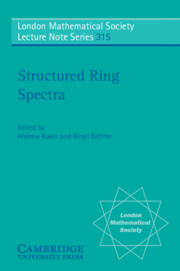Book contents
- Frontmatter
- Contents
- Preface
- The development of structured ring spectra
- Compromises forced by Lewis's theorem
- Permutative categories as a model of connective stable homotopy
- Morita theory in abelian, derived and stable model categories
- Higher coherences for equivariant K-theory
- (Co-)Homology theories for commutative (S-)algebras
- Classical obstructions and S-algebras
- Moduli spaces of commutative ring spectra
- Cohomology theories for highly structured ring spectra
- Index
(Co-)Homology theories for commutative (S-)algebras
Published online by Cambridge University Press: 23 October 2009
- Frontmatter
- Contents
- Preface
- The development of structured ring spectra
- Compromises forced by Lewis's theorem
- Permutative categories as a model of connective stable homotopy
- Morita theory in abelian, derived and stable model categories
- Higher coherences for equivariant K-theory
- (Co-)Homology theories for commutative (S-)algebras
- Classical obstructions and S-algebras
- Moduli spaces of commutative ring spectra
- Cohomology theories for highly structured ring spectra
- Index
Summary
The aim of this paper is to give an overview of some of the existing homology theories for commutative (S-)algebras. We do not claim any originality; nor do we pretend to give a complete account. But the results in that field are widely spread in the literature, so for someone who does not actually work in that subject, it can be difficult to trace all the relationships between the different homology theories. The theories we aim to compare are
• topological André-Quillen homology
• Gamma homology
• stable homotopy of Γ-modules
• stable homotopy of algebraic theories
• the André-Quillen cohomology groups which arise as obstruction groups in the Goerss-Hopkins approach
As a comparison between stable homotopy of Γ-modules and stable homotopy of algebraic theories is not explicitly given in the literature, we will give a proof of Theorem 2.1 which says that both homotopy theories are isomorphic when they are applied to augmented commutative algebras. This result is well-known to experts.
The comparison results provided by Mike Mandell [M] and Basterra-McCarthy [B-McC] can be cobbled together to prove that Gamma cohomology and the AndrΓ-Quillen cohomology groups in the Goerss-Hopkins approach coincide.
Acknowledgements We are grateful for help we got from Paul Goerss, Mike Mandell and Stefan Schwede: Paul insisted on the isomorphism which is now the subject of Theorem 2.6, Stefan initiated the whole project and the study of the relationship stated in Theorem 2.1; the proof of the isomorphism came out of a discussion with him.
- Type
- Chapter
- Information
- Structured Ring Spectra , pp. 115 - 132Publisher: Cambridge University PressPrint publication year: 2004
- 7
- Cited by



